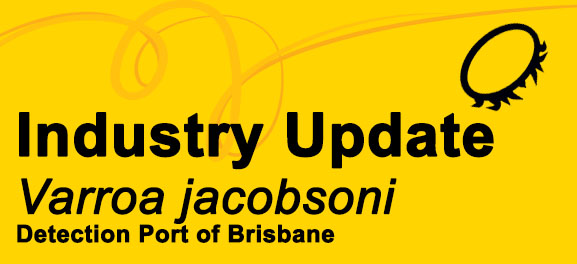AHBIC Industry Update 2- Varroa jacobsoni Port of Brisbane
6 March 2024Apis cerana Presence Confirmed As of 5th March 2024, Biosecurity Queensland have confirmed the presence of the Asian Honey Bee; Apis cerana and multiple European honey bee nests within the […]

Apis cerana Presence Confirmed
As of 5th March 2024, Biosecurity Queensland have confirmed the presence of the Asian Honey Bee; Apis cerana and multiple European honey bee nests within the Port of Brisbane. Of the Apis cerana bees at the Port of Brisbane, genetic testing has confirmed absence of exotic honey bee viruses and determined that this is a new incursion of Asian honey bee not linked to the Asian honey bee populations in the Cairns region.
Delimiting Surveillance
Active surveillance by Biosecurity Queensland and beekeepers from the Queensland Beekeepers Association continues within the Port of Brisbane area and within the 10km Movement Control Zone. This surveillance involves alcohol washing, drone uncapping (where possible), drone ballooning, floral sweeping and additional miticide strips and mats, being performed by authorised officers. To date, no further mites have been found through this active surveillance.
Movement restrictions in place: QLD
A 10km radius Movement Control Order is in place to assist in preventing the risk of spread of Varroa jacobsoni, beekeepers are not permitted to move any bee(living or dead), a swarm, nest or hive of bees, apiary equipment, or apiary products within the Control Area. For detailed information beekeepers should refer to the Movement Control Order: varroa-mite-carriers-movement-control-order.pdf (publications.qld.gov.au)
In short beekeepers in the movement control area must notify Biosecurity Queensland without delay about:
-
the presence of varroa mite
-
if you suspect the presence of varroa mite
-
any hive movements into or out of the localities in the previous 90 days
-
any bees bought or sold in the last 90 days.
AHBIC encourages QLD beekeepers to be registered and stay up to date through Queensland Department of Agriculture and Fisheries website: Varroa mite alert | Business Queensland or https://www.business.qld.gov.au/industries/farms-fishing-forestry/agriculture/animal/industries/bees/varroa-mite
AHBIC reminds beekeepers that in Queensland, varroa mite (both V. destructor and V. jacobsoni) is listed as prohibited matter under the Biosecurity Act 2014. Queensland beekeepers should continue monitoring hives for varroa mite, report their hive check results on the Bee 123 form and immediately report any unexpected hive deaths, deformed bees, bees with parasites, poor brood patterns and dead brood to Biosecurity Queensland on 13 25 23.
Beekeepers: All States & Territories
Importantly, all beekeepers should remember that the state of Queensland remains a biosecurity zone and any movements of Varroa mite carriers into Queensland require an approved permit through: https://www.daf.qld.gov.au/business-priorities/biosecurity/policy-legislation-regulation/biosecurity-instrument-permit
Continue exotic mite monitoring regularly in your hives, to learn more about alcohol washing check out the nationally agreed resource Bee Pest Blitz: https://www.planthealthaustralia.com.au/beepestblitz/
You can reach out to AHBIC via:
Varroa Coordinator
Bianca Giggins
0402 467 780
AHBIC, its employees, executive and consultants expressly disclaim all and any liability to any person in respect of anything, and the consequences of anything, done or omitted to be done in reliance, whether wholly, partly, upon the whole or any part of the contents of this industry update document.
